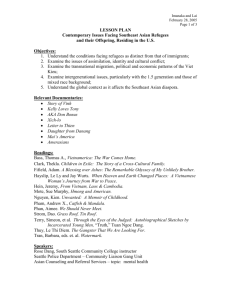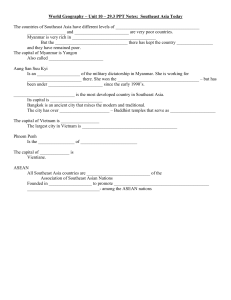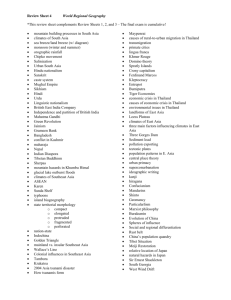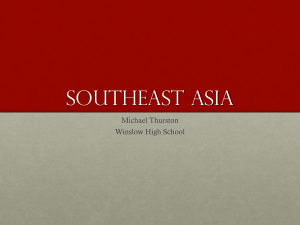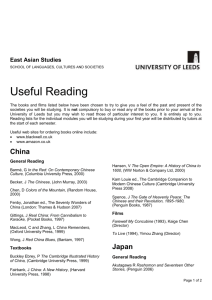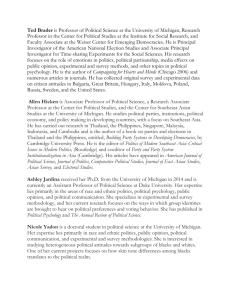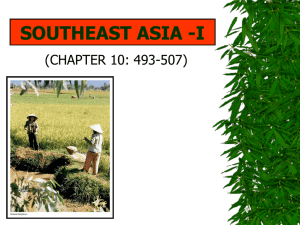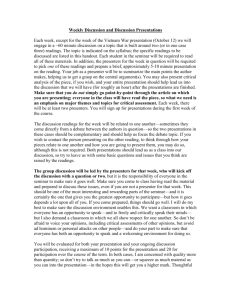center for southeast asian studies - International Institute
advertisement
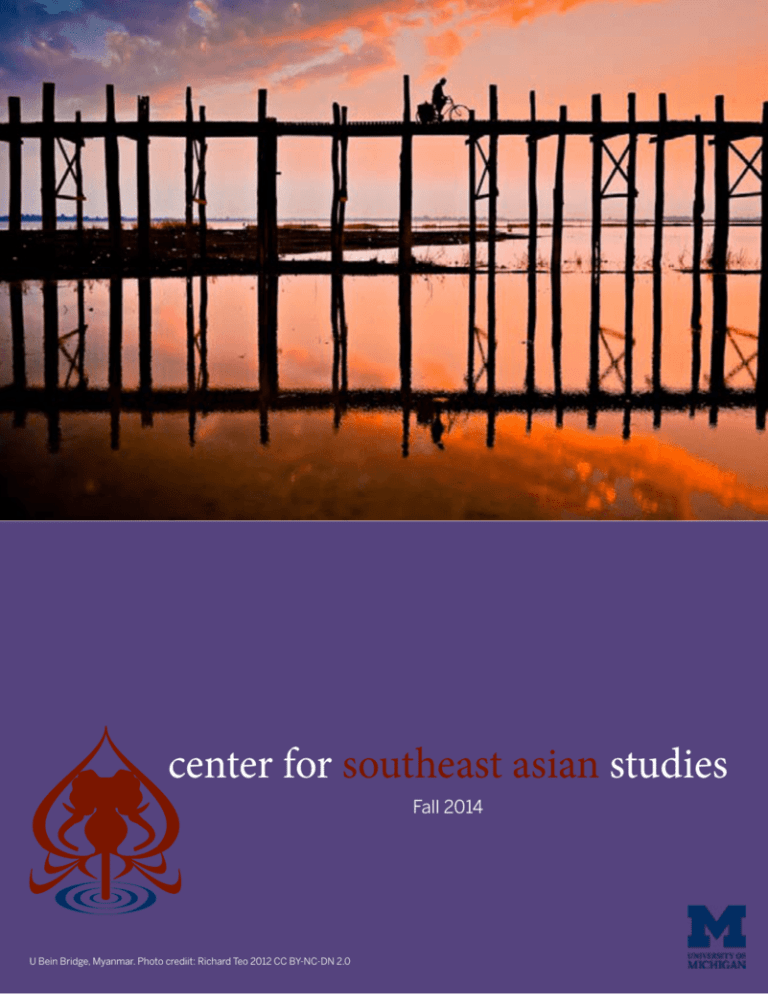
center for southeast asian studies Fall 2014 U Bein Bridge, Myanmar. Photo crediit: Richard Teo 2012 CC BY-NC-DN 2.0 Letter from the Director Dear CSEAS Community, Happy Autumn to all! In case you have not met them already, I would like to introduce our four first-year MA students: Kohlee Kennedy (research area: Thailand), Zoe McLaughlin (research area: Indonesia), Nicole Smolinske (research area: Thailand), and Jason Turner (research area: Vietnam). As always, there are also incoming Ph.D. students interested in Southeast Asia, and if you are a faculty member working with any of them, we would be grateful if you would let us know. We had a more active summer than usual, hosting a major conference on Dominant Party Systems in May (see page 2), a Philippine Rondalla music workshop, and a Rondalla concert in July (please see page 4). Part of the summer was spent preparing for the Title VI Department of Education National Resource Center and Foreign Language and Area Studies grants, an arduous task that was made easier for us with input from various faculty members and staff. Thanks to everyone for your help. We are proud to announce that we received both grants, maintaining our level of student support through FLAS fellowships and our ability to offer new and innovative programming on Southeast Asia. We are moving ahead with our new projects. year. The informal survey we sent to faculty members this summer was merely a fortunate coincidence, so thanks for your helpful responses. In addition, we continue to plan for the eventual move of the International Institute to the Dennison building, which is currently scheduled to occur in 2017. Finally, I look forward to working with members of this year’s CSEAS Executive Committee: Agustini (Asian Languages and Cultures), Nancy Florida (Asian Languages and Cultures), Susan Go (University Library), Berit Ingersoll-Dayton (Social Work), Webb Keane (Anthropology), and Nick Rine (Law School). Christi-Anne Castro Director We have another active and exciting year ahead with visiting scholars and artists from Southeast Asia, activities in partnership with the School of Public Health and School of Nursing, and a study abroad trip to Thailand for undergraduates, led by our Thai instructor Montatip Krishnamra. Our MA degree program, along with those of the other International Institute centers, will be undergoing its regular fouryear review by the Rackham Graduate School this Regents of the University of Michigan: Mark J. Bernstein, Julia Donovan Darlow, Laurence B. Deitch, Shauna Ryder Diggs, Denise Ilitch, Andrea Fischer Newman, Andrew C. Richner, Katherine E. White, Mark S. Schlissel ex officio. 1 The University of Michigan, as an equal opportunity/affirmative action employer, complies with all applicable federal and state laws regarding nondiscrimination and affirmative action. The University of Michigan is committed to a policy of equal opportunity for all persons and does not discriminate on the basis of race, color, national origin, age, marital status, sex, sexual orientation, gender identity, gender expression, disability, religion, height, weight, or veteran status in employment, educational programs and activities, and admissions. Inquiries or complaints may be addressed to the Senior Director for Institutional Equity, and Title IX/Section 504/ADA Coordinator, Office of Institutional Equity, 2072 Administrative Services Building, Ann Arbor, Michigan 48109-1432, 734-763-0235, TTY 734-647-1388. For other University of Michigan information call 734-764-1817. Program News Dominant Party Systems Conference By Kharis Templeman (PhD, Political Science, 2012), Research Fellow, Center for Democracy, Development, and Rule of Law in the Freeman Spogli Institute, Stanford University At the end of the winter term 2014, CSEAS partnered with the University of Malaya and many other on-campus units to sponsor an international conference on dominant party systems. Held May 9-10, 2014 at Rackham Graduate School, the two-day event brought together scholars from the University of Michigan and elsewhere to consider the origins and persistence of prolonged one-party rule around the world. Participants included a mix of established and junior scholars who had expertise in the party politics of a diverse array of countries, including Malaysia, Singapore, Taiwan, Japan, India, Tanzania, South Africa, Mexico, Russia, Italy and Canada. Participants gave brief presentations on the phenomenon of one-party dominance in their own regions of expertise, which served as a jumping-off point for a wide-ranging group debate about the patterns of ruling party survival across the cases, as well as consideration of how to refine or extend existing theories of dominance. Most participants agreed to revise their working papers to reflect common themes that emerged from conference discussions, and the group plans to reconvene for a second session at a future date to edit the papers further for joint publication. Terence Gomez speaks at the Malaysia Studies Forum. Speakers were: Kharis Templeman (Social Science Research Associate, CDDRL, Stanford University), Adrienne LeBas (Assistant Professor of Political Science, American University), Francoise Boucek (Lecturer of Politics and International Relations, Queen Mary University of London), Kenneth McElwain (Assistant Professor of Political Science, University of Michigan), Amir Abedi (Associate Professor of Political Science, Western Washington University), Carolyn Forestiere (Associate Professor of Political Science, University of Maryland, Baltimore County), Danielle Langfield (Assistant Professor of Political Science, Marist College), Adam Ziegfeld (Assistant Professor of Political Science, George Washington University), Jose Antonio HernandezCompany (PhD candidate, University of Chicago), Eunjung Choi (Assistant Professor of Political Science, University of South Florida), Keith Weghorst (Postdoctoral Research Fellow, Latin American Public Opinion Project, Vanderbilt University), Sarah Whitmore (Senior Lecturer in Politics, Oxford Brookes University), Netina Tan (Assistant Professor of Political Science, McMaster University), and Terence Gomez (Professor, University of Malaya). Additional participants included Allen Hicken (Associate Professor of Political Science, U-M), Joan Nelson (Scholar in Residence, School of International Service, American University), Ken Greene (Associate Professor of Political Science, University of Texas-Austin) and Anna Grzymala-Busse (Professor of Political Science, U-M). 2 Program News U-M’s School of Public Health has inaugerated a new partnership with Prince of Songkla University, Bangkok. With some CSEAS funding, in June 2014, a delegation including Dean Martin Philbert, faculty members Laura Rozek, Clifford Douglas, Rafael Meza, and Mousumi Banerjee, and a number of graduate students traveled to Prince of Songkla for the signing of the Memorandum of Understanding as well as a poster session, discussions for the beginning of joint research, and new student opportunities. Plans have been laid to bring faculty members from Prince of Songkla to U-M, and for students to participate in research projects at Prince of Songkla next summer. While in Thailand, the group met a traditional healer, explored the university, and found time for fun. Signing o f the Memorandum of Understanding Delegation from U-M School of Public Health, including SPH Dean Martin Philbert (Center right, seated) and faculty member Laura Rozek (far right, seated). Also pictured are graduate student Shama Virani (far right, standing) and faculty member Clifford Douglas (fourth from right, standing, back row), 3 The summer brought Philippine music to Ann Arbor! CSEAS sponsored a rondalla concert in July, with a pre-concert talk titled “Reconsidering Music and the Performance of Ethnic Identity” by CSEAS Director Christi-Anne Castro. Performing were: Michael Dadap (classical guitar) Tresates Rondalla (Riandra Bhoge, Angela Bhoge, Luzviminda Maurillo), Christi-Anne Castro, and Grecia Serrano-Navarro. The concert came a couple of months after CSEAS held a workshop on Rondalla music at U-M for educators and others interested in Philippine culture. Christi-Anne Castro teaching at Rondalla workshop, May 2014 Performing at Keene Theater, Residential College, July 26 4 Program News Exploring Research in Indonesia, from Architecture to Health The first major initiative of the United States-Indonesia Partnership Program (USIPP) Consortium took place in June 2014, with the participation of three University of Michigan faculty members. USIPP is a binational group of 12 colleges and universities committed to advancing academic collaboration between the United States and Indonesia. The three faculty members who participated in the workshop were professors Herek Clack, an environmental engineer; April Bigelow, a clinical professor in the School of Nursing; and Meredith Miller, an architect and designer in the Taubman College of Architecture and Urban Planning. None of these faculty members consider themselves to be Indonesianists, or even Southeast Asianists, so it was a true introduction to the field for them. The workshop provided a platform for the scholars to engage in discussions with Indonesian faculty members and in cross-disciplinary and cross-regional research interest groups. Participating faculty reported that the most valuable aspect of this workshop was the opportunity to meet face to face with experts in different fields. “More so than any other similar activity that I’ve experienced,” Professor Clack said, “this workshop brought together more of the important components needed to develop a new, collaborative applied research project: diverse people, backgrounds and ideas; compelling real-world challenges on a regional scale; and the right complement of eagerness to work together on the part of the participants.” Professor Bigelow, who has led student travel to Thailand and is considering expanding student opportunites to Indonesia, participated in a sub-group on food, water, and health. The group continues to meet regularly via Skype, and plans include potential research proposals for which they are identifying funding sources. Despite the geographical distance of Indonesia and the initial investment of time and energy to learn about the country, the participating faculty agreed that research in Indonesia is promising. Professor Bigelow particularly noted the “warm and welcoming” nature of universities, experts, and community members with which she interacted. “There are several federal grants that support research abroad with community partners, and there are many Indonesian community partners that would love to be involved with research.” CSEAS looks forward to seeing what projects come out of the United States-Indonesia Partnership Project Consortium. U-M, through CSEAS, joined the consortium at its inception in 2013. The USIPP consortium demonstrates a strong commitment from the higher education sector in both countries to complement goverment initiatives with private efforts. Dr. Herek Clack 5 Dr. April Bigelow Dr. Meredith Miller Faculty and Visitor News CSEAS welcomes three Library and Special Collections Visiting Scholars For the second year in a row, the Center for Southeast Asian Studies invites visiting scholars to utilize our collections and advance their research. Pauline Grace Basilia, arriving in October, will work with Carla Sinopoli on the Guthe collection of Philippine beads from the 14th-16th centuries. She intends to study the shell material in the collection, which has not been studied as much as the glass bead collection. Pauline is a student in the Archaeological Studies Program at the University of the Philippines-Diliman. Dr. Rommel Curaming is Lecturer at the University of Brunei Darussalam and Director for Historical and International Studies. His research project, “The Politics of Expertise: Joseph Ralston Hayden (1887-1945) as an Exemplar of Power/Knowledge?” will focus on archival material held at the Bentley Historical Library. His research will address the interplay between the political life and the academic persona of Hayden in order to address the inherently vested nature of knowledge production, distribution, consumption and evaluation. Dr. Curaming will be here in March 2015. Patricia Dacudao is an instructor at Ateneo de Manila University in the Philippines and is currently enrolled in a doctoral program at Murdoch University, Australia. Her research, which will form part of her doctoral dissertation, focuses on the history of Davao province, southern Mindanao, from 1989 to 1941 and how its settlement by the United States was shaped by the doctrine of Manifest Destiny. She will principally use the Worcester collections held by the Bentley Historical Library. She will be here in July 2015. Susan Walton was invited by the Indonesian goverment to attend Indonesian Independence celebrations. She participated as the U.S. representative at the Presidential Friends of Indonesia events, including meetings with many top officials in the government over the week of August 11-18, 2014. The delegation included representatives from Australia, China, France, india, Japan, Korea, Myanmar, and Peru. The invitation was extended to her by the Indonesian Consulate in Chicago. Indonesian Independence is celebrated on August 17. Montatip Krishnamra assisted the School of Nursing and the School of Public Health in preparing their students and faculty for trips to Thailand. She provided a multi-day orientation on Thai language and culture so that upon arrival, students and faculty would have some sense of what to expect and how to behave. The students and faculty enjoyed in immensely and benefitted greatly from the information. CSEAS thanks Montatip for her willingness to share her expertise, and plans to develop more mini-course modules to prepare U-M faculty and students to travel to Southeast Asia, particularly those who are new to the region. 6 Alumni News Bretton Dimick (PhD, Musicology, 2013) defended his dissertation on courtesan singing in Vietnam last fall and has since been busy teaching and writing in Charleson, South Carolina. His current courses include Introduction to Asian Studies in the College of Charleson Asian Studies Program and a new course on media, censorship and authoritarianism in Asia in their Honors College. He also teaches at a community college, Trident Technical College, and plans to teach in the music department at the College of Charleston the spring. Sahas Bunditkul (PhD, Engineering, 1978) remembers Ann Arbor from the 1970s. After receiving a PhD in Mechanical Engineering from U-M and then an MBA from the University of Leeds, he returned to Thailand. Sahas is now the Chairman of the Executive Committee and a member of the Board of Trustees of the Asian Institute of Technology and an Executive Board Member of the Research Institute of Thailand after serving as Deputy Prime Minister and Interim Foreign Minister of Thailand in 2008. Though now retired, he often gives lectures overseas on the subjects of strategic logistics and disaster management. Ann Arbor in the 1970s. Kate Gillogly (PhD, Anthropology, 2006) writes to her favorite place on U-M’s campus: “My news is that I earned tenure this year. I am now an Associate Professor of Anthropology. I am also the Director of the Center for International Studies. Ah, tenure - when the administrative workload increases exponentially! I am responsible for curriculum for our majors, and also for 7 Sahas Bunditkul, far right, with Montatip Krishnamra, far left at Niagara Falls in 1974. Montatip had just arrived in Ann Arbor. internationalizing the curriculum on the campus as a whole - among other things.” She also published a book, Everyday Life in Southeast Asia, co-edited with Kathleen Adams at Loyola University Chicago. The book aims to be a resource for teaching SEA to undergraduates. In the meantime, she still finds time for teaching, gardening, and research in her field, sustainability and natural resource manangement in Southeast Asia. Kimberly Goyette (PhD, Sociology, 1999) is the Director of the Center for Vietnamese Philosophy, Culture, and Society and Associate Professor of Sociology at Temple University. Her Center was recently awarded a grant from the Henry Luce Foundation to support small travel grants for Vietnamese scholars coming to the U.S. and U.S.-based scholars traveling to Vietnam to further their research agendas. They also sponsor conference, most recently one on Vietnamese Identities (with the Association of Asian Studies Vietnamese Study Group) in March 2014 and another one on Gender and Development in Vietnam in May 2014. Congratulations on the receipt of the Luce award. We look forward to the contribution this Center will provide to the field of Vietnamese Studies! After 17 years in Thailand, Karyn Kaplan (MA, SEAS, 1990) returned to New York to work for Treatment Action Group (TAG) as their Director of International HIV/Hepatitis Policy and Advocacy. She works with activists in low- and middle-income countries on treatment access issues. Earlier this year, she received the Founder’s Award from Health GAP Coalition, a US-based global HIV/AIDS treatment advocacy coalition. She also serves on the Strategic and Technical Advisory Committee on Hepatitis for the World Health Organization. She continues to support the community-based organization in Bangkok that she co-founded, Thai AIDS Treatment Action Group (TTAG). Feel free to contact her at karyn.kaplan@ gmail.com. counterpart offices in the government of Vietnam, as well as civil society partners and international organizations. He is serving there on a two-year term, and would be happy to speak with any CSEAS students interested in Vietnam, or anyone passing through Hanoi. Contact CSEAS to get his email address. Michael Stern (PhD, Political Science, 2006) recently took on a new, one-year assignment for the U.S. Agency for International Development at the U.S. Embassy in Kabul, Afghanistan. He writes: “Though Afghanistan has historical connections with Southeast Asia through the Silk Route and a heritage of Buddhism in some areas (think Bamiyan), security conditions make it very hard to see much of the country. For those who remember my family, and warm greetings to all that do from all four of us, we are all well. I can always be reached at my usual email: sterna@umich.edu.” Karyn Kaplan Jeremy Saul (PhD, Asian Languages and Cultures, 2013) has moved to Thailand to begin a lecturing position at Mahidol University. He hopes to teach courses on spirit worship and on Islam in Southeast Asia, and welcomes any CSEAS students or alumni to reach out to him if they are passing through Thailand. Andrew Shepard (JD, 2008) writes from Hanoi, where he is currently the Deputy Environment, Science, Technology & Health Unit Chief at the U.S. Embassy. He manages U.S. foreign policy objectives in Vietnam on those issues, frequently liaising with Lang Bac Ho, Ha Noi. Photo by Andrew Shepard. 8 Coming this Fall to CSEAS Fridays at Noon Lecture Series Fall 2014 Please join us for our continuing tradition of Friday at Noon Lectures on Southeast Asia. This fall, we will host lectures by: Kenneth Hall (Ball State University). An alum of our own, Ken Hall has published extensively on early South and Southeast Asian history, most recently “A History of Early Southeast Asia: Maritime Trade and Societal Development, 100-1500.” He is the editor of a Comparative Urban Studies book series published by Rowman and Littlefield’s Lexington Press. During 2003-2004 he served as a senior Fulbright Scholar at Gadjah Mada University in Indonesia, facilitating Christian-Muslim community dialogue and preparing a book manuscript on the history of early Java. Dr. Hall’s talk at CSEAS on September 12 is titled: “Commodity Flows, Diaspora Networking, and Contested Agency in the Eastern Indian Ocean c. 700-1500.” Mary Steedly (Harvard University). Another U-M alumna, Dr. Steedly is professor of social anthropology at Harvard University. Her fieldwork has focused on the Karo Bataks of Indonesia, a kinshipbased society of the Northern Sumatran uplands deeply implicated in colonial and post-colonial project of modernity, development and nation-building. She published most recently “Rifle Reports: Gender, Nationalism and Peasant Resistance in the Karo Area, 1945-1950.” This book explores the Indonesian war of independence from the perspective of Karo participants. Dr. Steedly’s talk at CSEAS on October 3 is titled “Eating an Elephant, Imagining a Community: Alimentary Nationalism and the Memory of the Senses.” 9 Karl Jackson (Johns Hopkins University). Dr. Jackson is C.V. Starr Distinguished Professor of Southeast Asia Studies at the School of Advanced International Studies at Johns Hopkins University. He has published widely, from the Khmer Rouge period in Cambodia, to Indonesian political behavior, to the Asian financial crisis of the late 1990s. He has advised government and non-governmental bodies, including the World Back, International Finance Corporation, and the Office of the Vice President and the Office of the President of the United States. Dr. Jackson’s talk at CSEAS on October 31 will be in conjunction with his collaborator Giovanna Maria Dora Dore is titled “Democracy is more Difficult than Physics: Evidence from Indonesia, Korea, the Philippines, and Thailand.” Kosal Path (Brooklyn College, The City University of New York). Dr. Path is professor of political science who focuses on international relations, comparative politics, and Asian studies. He specializes in the role of nationalism and national identities in shaping foreign policy discourses in East and Southeast Asia. In particular he is interested in China’s relations with its Southeast Asian neighbors. Recent publications include: “The Economic Factor in the Sino-Vietnamese Dispute” (Cold War History Journal, 2011); “Sino-Vietnamese Territorial Dispute, 197478: Vietnamese Nationalism and Its Consequences (International Journal of Asian Studies, 2011); and “Hanoi’s response to Beijing’s Enthusiasm to Aid North Vietnam, 1970-72” (Journal of Vietnamese Studies, 2011). Dr. Path’s talk at CSEAS on December 5 is titled “China’s Aid to North Vietnam during the Vietnam War, 1965-1975.” Van-Anh Vo, dan tranh musician On October 27, we will host musical star Van-Anh Vo for a concert of modern Vietnamese folk music. Preceding the musical performance, we will host a talk between Van-Anh Vo and Alexander Cannon (PhD Musicology, 2011). Van-Anh Vo comes from a family of musicians and began studying dan tranh (16-string zither) at the age of four. She graduated wtih distinction from the Vietnam Academy of Music, where she later taught. In 1995 Van-Anh won the championship title in the Vietnam National Dan Tranh Competition, along with the first prize for best solo performance of modern folk music. In Hanoi, Van-Anh was an ensemble member of Vietnam National Music Theatre as well as a member of the traditional music group Dong Noi Ensemble, which she founded and directed. She has since performed in more than 14 countries and recorded many broadcast programs in and outside of Vietnam. composer and guest artist for the Kronos Quartet at the Olympic Games 2012 Music Festival. In 2002, Van-Anh released her first CD, Twelve Months, Four Season; and in 2009, she released She’s Not She with award-winning composer Do Bao. Recently, her third CD Three-Mountain Pass featuring Kronos Quartet was chosen to be NPR’s 10 Favorite World Music Albums of 2013. Van-Anh dedicates her life to creating music on the dan tranh and fusing Vietnamese muscial tradition with fresh new structures and compositions. Since settling in the San Francisco Bay Area in 2001, VanAnh has focused on collaborating with musicians across different musical genres to create new works, bringing Vietnamese traditional music to a wider In addition to touring internationally, Van-Anh has presented her music at Carnegie Hall, Zellerbach Hall, Lincoln Center, Kennedy Center, and as a audience, and preserving her cultural legacy through teaching. In addition to dan tranh, Van-Anh also performs as soloist on the monochord (dan bau), the 36-string hammered dulcimer (dan tam thap luc), the bamboo xylophone (dan t’rung), the open-ended bamboo tubes (dan K’long put), traditional drums (trong), and Chinese zither (guzheng). She lives and teaches in Fremont, California. For more information, please go to www.vananhvo.com. Don’t miss the show: October 27, 7:15 pm, Helmut Stern Auditorium, University of Michigan Museum of Art 10 Student Updates Welcome to our new MA students Four students join us this year: Our Masters in Southeast Asian Studies Program Kohlee Kennedy (BA, Linguistics, University of Michigan) remains here on campus to continue her studies. As an undergraduate she traveled on a student trip to Thailand led by Montatip Krishnamra. She plans to focus on the practices of reading in Thailand and to further her understanding of linguistics. One of the oldest programs devoted to the study of this region in the United States, the Masters of Arts in Southeast Asian Studies offered by the Center for Southeast Asian Studies provides students with a broad interdisciplinary approach to these students while allowing the flexibility to pursue individual areas of interest. The degree requires: Zoey McLaughlin (BA, Biochemistry and Creative Writing, Oberlin College) lived in Yogyakarta, Indonesia, for several years after finishing her undergraduate degree. She returns to school at Michigan in order to further explore the Indonesian language and translation studies. • Introductory interdisciplinary course in Southeast Asian Studies (SEAS-501) • 25 hours of graduate level course work, in at least three disciplines, with at least 12 hours at 500 level or above • Southeast Asian Studies Research Prospectus course (SEAS-502) • Intermediate level language skills in a Southeast Asian language • Master’s Essay, a substantial research paper approved by two faculty members, at the level of quality of a publishable academic paper. Nicole Smolinske (BA, Political Science, Asian Studies, and Philosophy, Washington State Honor’s College) spent time in Thailand during her undergraduate career and plans to further her studies in Thai language and political and social theory. Jason Turner (BA, Psychology, University of North Carolina, Chapel Hill) is a Captain in the U.S. Army currently serving at the Office of Defence Cooperation at the U.S. Embassy in Hanoi. He comes to Michigan to round out his studies on the region and to improve his Vietnamese language skills, in addition to grappling with questions of development policy and international security cooperation. The degree typically takes two years to complete, though in some circumstances the time to degree can be shortened. We encourage students to travel to the region during their first summer for research or work experience and increased language exposure. Danna Jo Matsuki, our continuing MA student, won a Rackham Graduate Student Research Grant to support her summer research in Indonesia. Danna Jo Matsuki 11 Donor Profile: Jay Yoshioka In May 2015, a lucky group of Thai language students will travel to Thailand with their teacher, Montatip Krishnamra, for several weeks of action-packed, fun-filled cultural learning. Not only that, but they will enjoy the entire experience expense-free, thanks in large part to contributions from our alumnus Jay Yoshioka (MA/MBA ‘94). Jay has been a consistent supporter of the Center for Southeast Asian Studies and, in particular, our Thai Studies program. Remembering his own experiences in Montatip’s classroom, he is happy to make possible Thai language learning opportunities to current students. Jay chose to study here on the strength of Michigan’s joint MA/MBA program. While living in Bangkok, he decided to return to graduate school and wanted a top-ranked university in both business and Southeast Asian studies. Of the three he considered (the other two were Cornell University and University of Berkeley), the integration of the two degrees at the University of Michigan impressed him most. In addition to studying under Montatip (where he says he laughed as much as he studied), he also worked with Linda Lim (Business) in her Business in Asia course and remembers Pete Gosling (Geography) through his lectures on Southeast Asia at Lane Hall, the former home of the Center for Southeast Asian Studies. Jay currently works at Wells Fargo Bank, where he is Vice President for their Home Lending Affluent Strategy Department. While he no longer works internationally, he started out with Northwest Airlines, later becoming Delta, in their Asia Pacific Planning group. This was a great fit for the expertise he gained at Michigan. He transitioned from there into another international business position, as Global Marketing Director for RCI, a lodging group of the Cendant Corporation in New York City. However, the events of September 11, 2001 provoked the need for change, and he decided to move to San Francisco and into the financial services sector. He appreciates working for Wells Fargo, which is supportive of its team members, its customers, Jay Yoshioka (middle) with friends at CSEAS’ 50th Anniversary reunion in 2010. and its communities. In fact, he has consistently leveraged the Wells Fargo matching donation program to match all his donations to CSEAS, doubling his own contribution. While he doesn’t have the opportunity to use his Thai language skills in his working life, they come in handy to gossip with certain co-workers and on his frequent trips back to Thailand to visit friends. Jay hopes this generation of undergraduate students understands the imperative to learn a foreign language. “In a world where English is more and more spoken, there sometimes appears little need to learn a language, let along a language spoken in only one country such as Thai . . . [But] language acquisition is not the final goal. Rather, it is the vehicle through which we can learn about the culture, the concepts, and the lives of others.” He hopes the students on this trip to Thailand will not only hone their Thai language skills, but also “discover how wonderfully amazing Thai culture is and enjoy the moment.” 12 Spring Fund Drive: New! Globalizing the Undergraduate Experience Southeast Asian languages are becoming more important than ever for business people, nonprofit organizations, healthcare workers, academics, and many others. When undergraduates study Southeast Asian languages at U-M, they not only learn vocabulary and grammar, they also begin to experience different cultures and world views. Further, language study invites students to travel abroad. A number of U-M trips to Southeast Asia are funded in entirety, allowing all students to take advantage of the opportunity to experience more of the world. Finally, by just studying our languages, students become eligible for academic year and summer funding. Please join us in an ongoing campaign to internationalize the undergraduate experience at U-M. http://www.ii.umich.edu/cseas/alumnifriends/ supportcseas Pledge level: Platinum $1,000 Sponsoring at this level provides one language scholarship for the 2014-2015 academic year. Fund 309964; please note “sponsor a student” in instructions field (online) or memo line (check donations) Pledge level: Gold $500 Sponsoring at this level provides one semester of a language scholarship for the 2014-2015 academic year. Fund 309964; please note “sponsor a semester” in instructions field (online) or memo line (check donations). Pledge level: Silver $100 Fund 309964; please note “Global Undergraduate” in instructions field (online) or memo line (check donations). Pledge level: Bronze $50 13 Fund 309964; please note “Global Undergraduate” in instructions field (online) or memo line (check donations). Support CSEAS Javanese Gamelan Endowment (731164) Student Initiatives This endowment supports programs in the Javanese performing arts at the University of Michigan, including annual concerts and upkeep of the University of Michigan Gamelan Ensemble and residencies with prominent Javanese musicians, dancers and puppeteers. Undergraduate (309964) and Graduate (309966) Student Support Michigan’s superb undergraduates have few opportunities to “discover” Southeast Asia on their own. These funds provide incentives for undergraduates to avail themselves fully of our excellent faculty and language resources. We continue to attract the very best young graduate students interested in the region, and do our best to support their education. Southeast Asian Language Endowments These language endowments are used to support the teaching of Southeast Asian languages at Michigan. Funds are used to support the hiring and retention of our outstanding language lecturers and for student scholarships Indonesian Language Endowment (731412) Filipino Language Fund (318576) Thai Language Endowment (731411) Miller-Tran Endowment for Vietnamese Language (731613) of engagement with Thai Studies. We have used income from the endowment to support student travel to Thailand, both graduate and undergraduate, and faculty and graduate student research in Thailand. Indonesian Studies Initiative (312227) Philippine Studies Endowment (731185) Indonesian Studies has long been a particular strength at the University of Michigan. We support faculty and student research, teaching and public programs on Indonesia, and we plan to establish an endowment for Indonesian Studies in the near future. The Amnuay-Samonsri Viravan Endowment for Thai Studies (572202) allows us to fund all manners This endowment supports the continued study of the Philippines and Filipino languages and cultures at the University of Michigan. Income from the endowment supports faculty and student research, teaching and curricular development about the Philippines at the University, and outreach to the local community. These donors gave in the last year, and we thank them for their generosity. Without you our work would not be possible. Bold indicates first time donors; asterisks indicate faculty, emeriti, and staff. William Anderson Michael Beebie Paul Belmont Irene Berkey Richard Bernhard Jan Berris Bonnie Brereton Robbins Burling* Brent and Valerie Carey Christi-Anne Castro* Stanley and Sriwan Chan Alma Ambrosia Chand Paul and Elisabeth Churchill John Ciorciari* Elizabeth Cisne David Dettman Michael Dunne Vera Flaig Nancy Florida* Catherine Fortin Alice Frye Beth Genne* Michael Gluckstein, in honor of Ms. Rebecca W. Gluckstein Martha Gordon Pete Gosling* Mya Gosling Patrick Griffin John and Sunee Grima Shuk Moy & Ralph Hartshorn Patricia Henry Allen Hicken* Olana Hirsch Khan Tom Hudak Leenaporn Jongpaiboonkit Pamela Joyce Webb Keane* John Knodel* Linda Lim* Rob and Quincy Northrup Norman Owen Susan Pratt Walton* Delia Rayos Nick Rine* Priscilla Rogers* Fe D. Rowland Carla Sinopoli* Mark S. Slobin Sherri Smith Henry Spiller John Spores and Sharifah Syedahmed Richard Sussman Alan Templeton Thang-Long Ton Mary-Louise Totton Lois Verbrugge* Sandra Voglesong Fields Eric Wakin Adelwisa Weller* John Whitmore* Edward and Corazon Yee Christopher Yee Jay Yoshioka Evans Young* 14 Center for Southeast Asian Studies 1080 S. University Avenue, Suite 3603 Ann Arbor, MI 48109-1106 SEA on campus This May, CSEAS hosted a Rondalla Music workshop designed for music educators and the public. We invited classical guitarist Michael Dadap to teach. The workshop was well-attended and participants left with a deeper sense of the music and its technicalities. NON-PROFIT ORG U.S. POSTAGE PAID ANN ARBOR, MI PERMIT NO. 144
